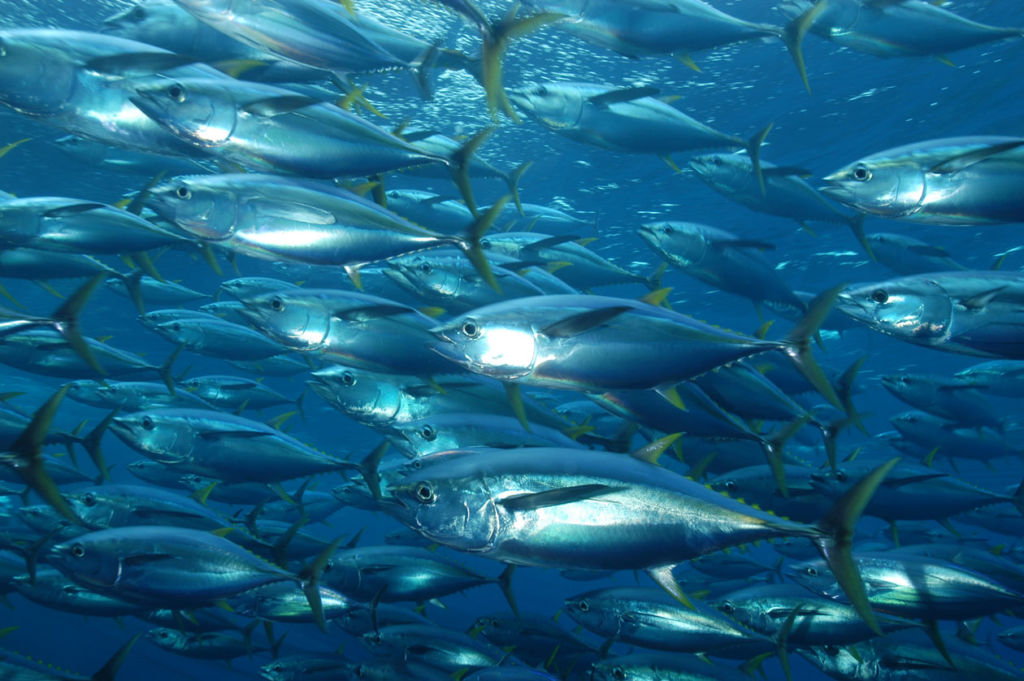[LUM#12] Towards depopulated oceans
Reducing greenhouse gas emissions would (also) protect marine biodiversity. A new study shows that global warming will drastically reduce the abundance of animals in the ocean.

A warmer, less populated ocean. That is what lies ahead by 2100, according to the most comprehensive analysis of the effects of climate change on marine ecosystems published to date. According to this study, if greenhouse gas emissions continue at the current rate, 17% of the world's marine animal biomass could disappear by 2100. "This refers to the total weight of marine animals such as fish, invertebrates, and marine mammals in the ocean," explain Yunne Shin and Olivier Maury, co-authors of the study and researchers at the Marbec laboratory ( Marine Biodiversity, Exploitation, and Conservation).
Large marine animals under threat
Why does global warming affect ocean populations? "Two major processes are at work: increased dissipation and decreased primary production, " replies Olivier Maury. "The increase in water temperature will lead to an acceleration of all biological processes because metabolism is faster in a warmer environment. This phenomenon leads to an increase in energy dissipation." A faster metabolism therefore implies an increased need for resources.
The bad news is that the amount of available resources will actually decrease, which researchers refer to as a decline in primary production: " This is actually phytoplankton, " explains Yunne Shin. " These microscopic plant cells are the basis of all ocean food chains, and with global warming and ocean acidification, phytoplankton density will decrease." Estimates suggest a decline of between 8% and 12% globally.
This decline in primary production will have a greater impact on large marine animals, many of which are already in a precarious situation. "The decline in phytoplankton has a greater impact higher up the food chain, creating a domino effect known as trophic amplification, " explain Yunne Shin and Olivier Maury.
Major stress
Global warming will therefore have uneven consequences depending on the species, but also depending on the region. And it is the intertropical zones that will pay the heaviest price. "According to some models, the water temperature could reach 35 degrees in certain regions of the western Pacific, which will become uninhabitable." As a result, ocean populations will migrate toward the poles, completely redrawing the world map.
While it is possible that we will see an increase in biomass in certain polar regions around the Arctic and Antarctic, it is certain that we will observe a drastic decrease in many temperate and tropical ocean regions: "Biomass will decline very sharply, by 40 to 50%, even though these are areas where marine biodiversity is already severely affected by human activities," says Yunne Shin.
And the consequences will not be limited to aquatic life: "These are precisely regions where human populations depend directly on ocean resources for food," adds Olivier Maury, "so it is also a question of global food security." In these regions, climate change will therefore constitute a major stress not only for marine ecosystems, but also for human societies .
Prevention and adaptation
For researchers, the key word in light of these scenarios is anticipation. "Obviously, we must do everything we can to limit CO2 emissions, but we must also reconsider biodiversity conservation and fisheries management measures in light of climate change, " they recommend. This new study is therefore a further incentive to develop sustainable and adaptive fishing practices that will help feed the 11 billion people who will populate the planet by 2100.
"On the one hand, the human population is set to grow, and on the other, marine resources, which make a vital contribution to global food security, are at risk of declining by up to 30-35% according to some models," warns Olivier Maury. "It is urgent that governments at all levels take note of our findings. Our scenarios can help anticipate threats and develop prevention and adaptation strategies. The challenge is clear: we must avoid what we cannot manage and give ourselves the means to manage what we cannot avoid."
Unique expertise
To develop these scenarios, 35 researchers from 12 countries and 4 continents have come together to form the international FishMIP (Fisheries and Marine Ecosystem Model Intercomparison Project) consortium, a group of experts and modelers working on marine ecosystem dynamics in the context of climate change. According to their simulations, marine animal biomass will decline regardless of the CO2 emission scenarios considered. " However, this decline would be limited to 5% if global warming were limited to 2 degrees, " the researchers say.
Find UM podcasts now available on your favorite platform (Spotify, Deezer, Apple Podcasts, Amazon Music, etc.).